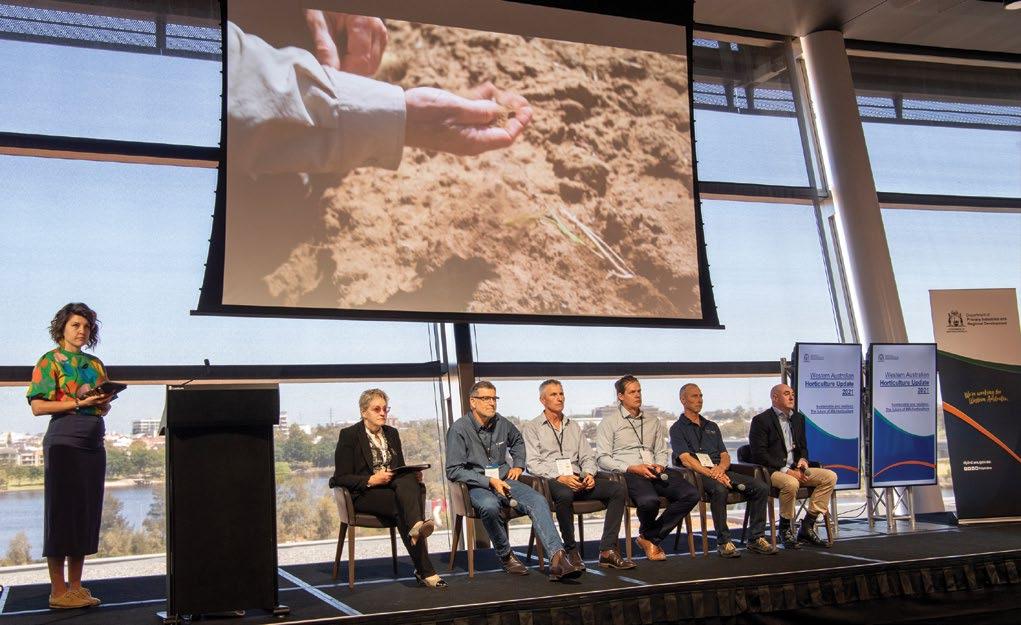
7 minute read
WAHU2021
puts WA horticulture centrestage at Optus Stadium
Resilience and sustainability were the key themes at this year’s Department of Primary Industries and Regional Development’s 2021 Western Australian Horticulture Update (WAHU2021). Held at Perth’s Optus Stadium on Thursday 4 November, the biennial event attracted a veritable mix of growers, grower group advocates, industry leaders and stakeholders, universities, and researchers, and boasted more than 30 presenters. Master of Ceremonies, Elizabeth Brennan, encouraged attendees to think beyond the needs of today and consider how the industry will face the changing market, food security, environment, and business conditions on the horizon. The Hon Alannah MacTiernan MLC, Minister for Regional Development; Agriculture and Food; Hydrogen Industry officially opened the event and provided insight on new initiatives being launched by the State Government. Minister MacTiernan was joined by a panel of growers, researchers, agribusiness and grower advocates on stage, where they discussed sustainability, water usage and waste management. International market keynote speaker, David ‘Dr Food’ Hughes, kicked off the day with an analysis of horticulture markets and future trends, drawing upon examples in the United Kingdom, USA, Europe and Australia.
Advertisement
WAHU2021 theme was sustainability and resilience.
One of David’s key points was for WA growers to “shout more” about their produce, inform consumers about why their product is better than a competitor, the health benefits, and its premium value.
He reminded attendees that clever branding and messaging can make the difference in attracting consumer attention and therefore securing the future of the industry.
f A sustainable future panel with Minister MacTiernan MLC at WAHU2021.
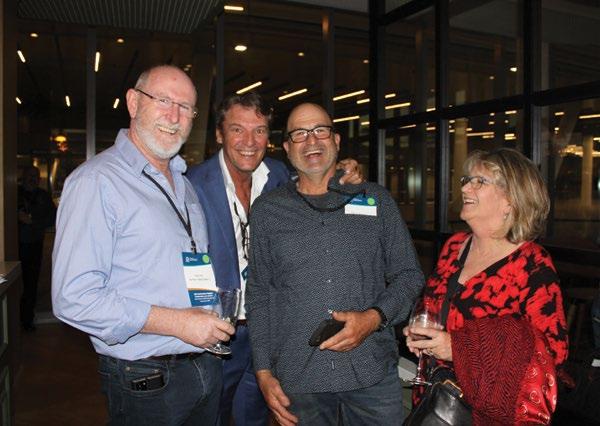
1 2
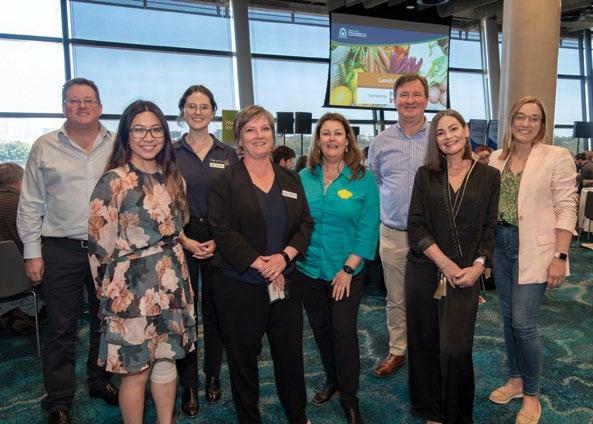
3
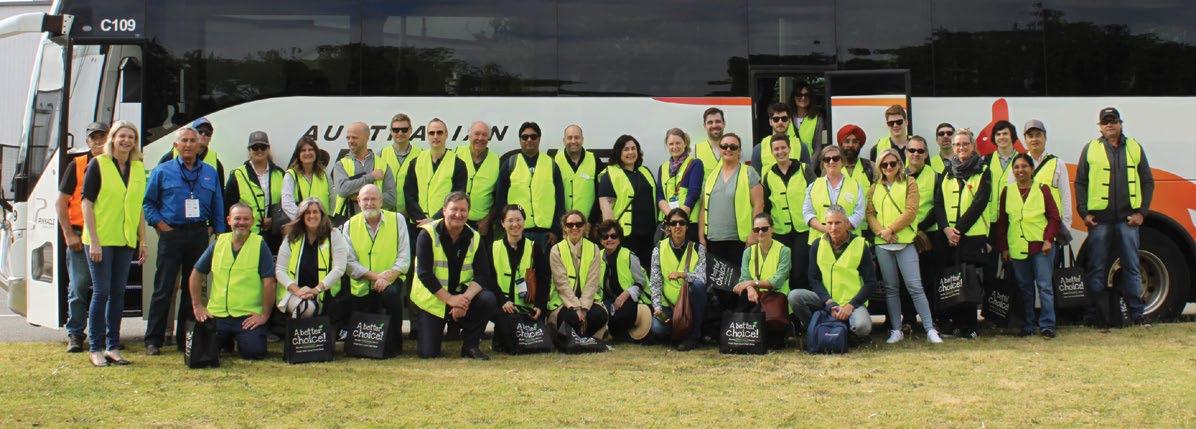
Hot topics
Two significant hot topics on the WAHU2021 agenda included a panel session on plastics and packaging, and a panel on workforce solutions. 1. The plastics and packaging panel had the audience voicing their concerns regarding the impending
Government-led Plan for Plastics to reduce single use plastics.
From an industry perspective, packaging forms a critical part of ensuring fresh produce sells on shelf at the retail store. It offers protection from bruising and damage, increases shelf life, prevents dehydration, provides defence for food security concerns, offers a place to communicate what the product is, and it can differentiate products with marketing messages such as organic, place of origin etc.
One audience member queried f 1. Planfarm networking sundowner; 2. WAHU2021 why agriculture was being targeted industry steering committee; 3. WAHU2021 on the road at more than other industries when Perth Markets. agriculture was already actively addressing wastage issues.
The question was posed—why aren’t consumers being better educated and why is the burden for change being placed on producers?
2. The workforce solutions
panel looked at the current issues and attraction levels of the industry, and the opportunities for growers to access employment options. Perspectives were given from a service provider, a grower, a co-operative and DPIRD. There was also focus on social media as a marketing tool for growers, and renowned digital marketing strategist Meg Coffey talked about effective social media strategies (tailor the message to the platform and use hashtags!), and local campaigns that have used social media well.
Extremely good food for
There was a focus on social media as a marketing tool for growers. thought! The day also exposed attendees to a range of food initiatives, which will support the future sustainability of the WA horticulture industry. These included: • A two-course, seated lunch sponsored by Hort Innovation, which gave a presentation on their extension plan for the region and specific WA initiatives and projects. • A Planfarm sponsored networking sundowner at the Goodwood Restaurant.
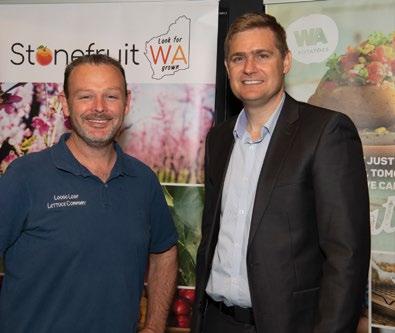
f PETER Dobra, Loose Leaf Lettuce Company and Rohan Prince, DPIRD at WAHU2021.
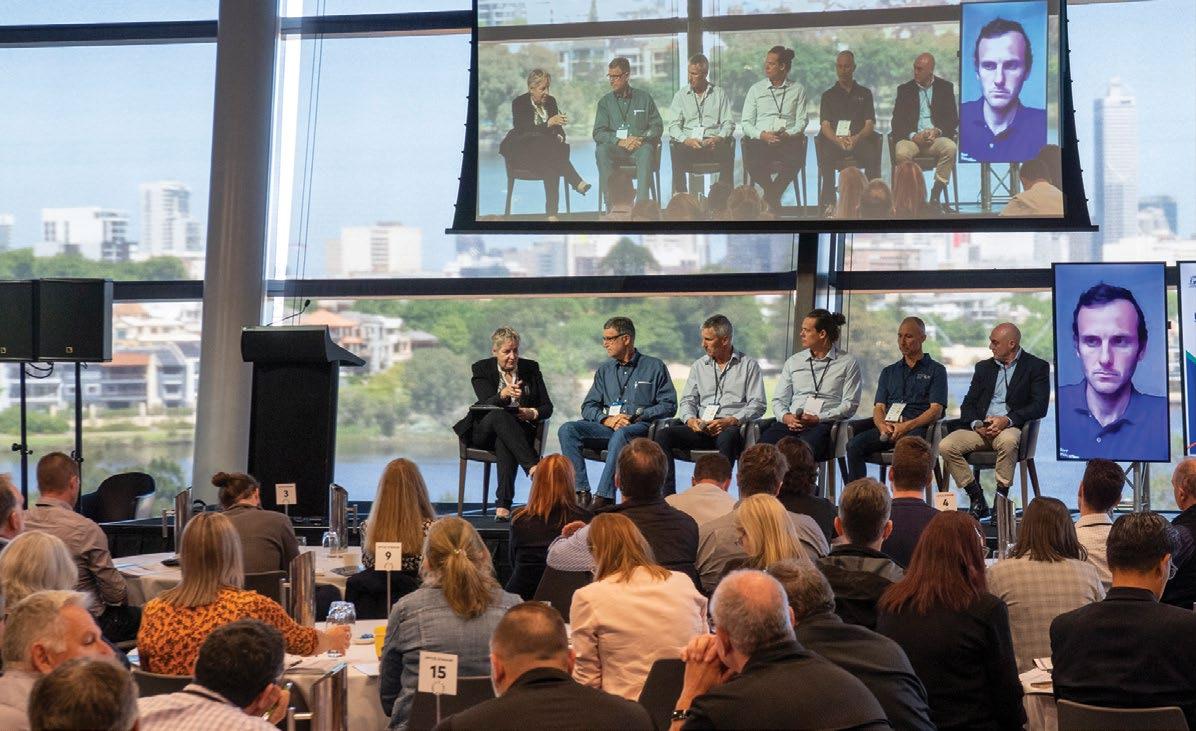
• A wine tasting at the sundowner organised by DPIRD Research scientist Richard Fennessy and technical officer Yu-Yi Liao, showcasing a selection of trial wine varieties. The variety trials are part of a DPIRD project investigating the sustainability and profitability of the national and state wine industry. • On the Friday following the Thursday conference, a DPIRD hosted ‘WAHU on the Road’ farm and industry tour.
The tour included visits to the Perth
Markets wholesale produce facility, the RichGro bio-energy plant, the
Black Soldier Fly waste management research (being undertaken by Future
Green Solutions), Avowest orchards’ crop netting and water use efficiency trial, and Benara wholesale and production nursery.
Overall, the 2021 WAHU events hosted by DPIRD offered an abundance of ideas, discussion opportunities and networking at all levels.
While the theme was sustainability and resilience, the event provided a reminder that the WA horticulture sector is incredibly strong, diverse and vibrant… and works best when it works together.
Director’s note
BY ROHAN PRINCE DIRECTOR HORTICULTURE & IRRIGATED AGRICULTURE, DPIRD
Thank you to industry members who attended the 2021 Western Australian Horticulture Update (WAHU2021) on 4 November at Optus Stadium and ‘on the road’ on 5 November. It was great to catch up with you.
DPIRD was delighted to host WAHU21, which was strongly supported by Hort Innovation, the Agricultural Produce Commission, Pomewest, WA Citrus, Stonefruit WA, Southern Forest Food Council, Sweeter Banana, Market West, WA Potatoes, vegetablesWA, and the trade and sundowner sponsor Planfarm. I hope you got as much out of the event as we did. The theme ‘Sustainable and resilient: the future of WA horticulture’ was designed by the industry steering committee but would have had many different meanings to different people.
For me, WAHU was about providing a forum to discuss changing market expectations, challenges worth tackling together, and gaining insights into blind spots we may need to build awareness or focus on.
I hope the outcome for you was a greater connection across industry that helps WA Horticulture prepare, adapt and when needed change to remain sustainable and resilient.
So, what are the challenges facing you that were presented at the WAHU?
Environmental, social, governance — ESG! These criteria are standards for a company’s operations that socially conscious consumers and investors use to screen potential purchases and investments.
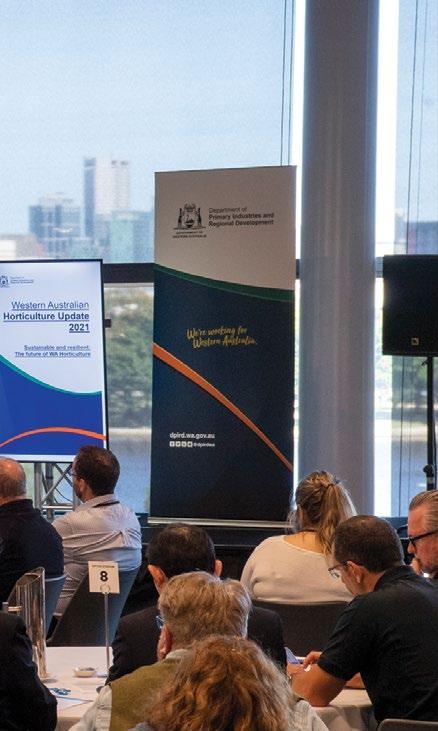
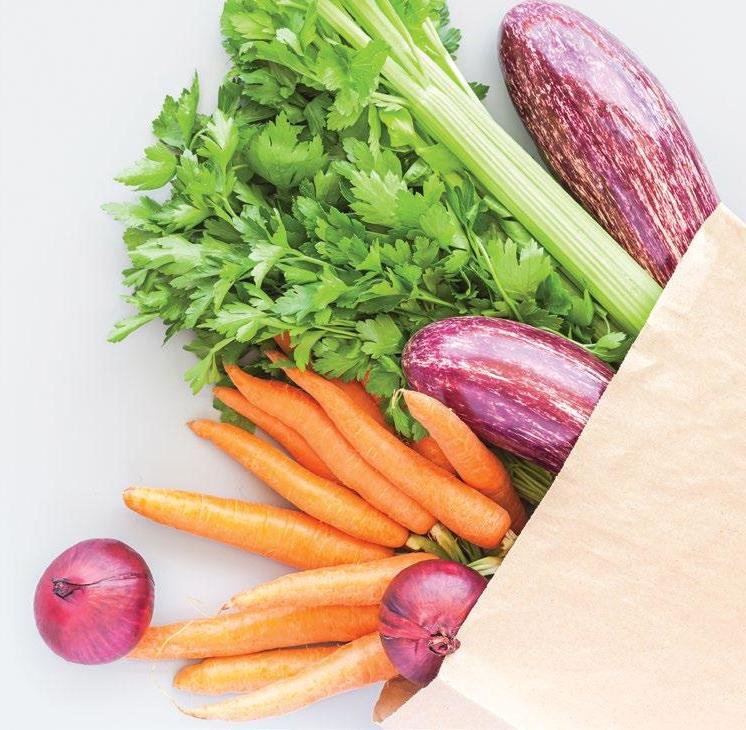
Environmental measures performance as a steward of nature; Social reflects relationships with employees, suppliers, customers, and the communities where you operate: and Governance deals with a company’s leadership, management, transparency and shareholder rights. Dr Food, Professor David Hughes, talked about the eco-sensitive consumers around the globe looking to buy food that’s compatible with their “greener” values. Growing your crops to maximise production while minimising inputs and minimising waste and environmental impact is not only going to be needed to maximise your return on capital, but also to access more and more mainstream markets.
Some examples of Environmental issues include how horticulture businesses respond to climate change. How is WA horticulture able to be a solution to climate — not a contributor?
There are many challenges but also opportunity on the horizon. No matter how small the overall contribution of the industry, there is expectation from consumers that agriculture, including horticulture, has no impact on the climate.
f HORTICULTURE can be part of a solution to climate change by more efficient production.
Horticulture can be part of a solution to climate change by more efficient production, building carbon in the soils, lowering emissions from production, and reducing waste of food from paddock to plate. Although we know there is a massive education piece required to help consumers understand there is a shared responsibility, and that if a cosmetically imperfect piece of fruit has no market or is wasted in their fridge, our industries are significantly challenged to meet consumer expectations. WA’s Plan for Plastics reflects the modern consumer expectations to reduce single use plastics, and our challenges with labour are going to require some innovative and alternative solutions. We recognise the technical and economic challenge of this and will work with industry on solutions together. By working collaboratively there is potential to reduce the burden on any one single industry or individual business, to deliver solutions efficiently, and help meet consumer expectations to maintain social licence and therefore access to markets.
Sourcing the workforce needed to sustain and grow industry will likely need a cross-industry approach. What is an employee in horticulture looking for that is not currently being provided that will make horticulture a real option, and how do we find this out? In the next couple of months DPIRD will facilitate workshops on these issues looking to not only describe the problems, but also develop a roadmap to move forward with industry solutions. I encourage you to join the conversation and bring There are many challenges but also opportunity on thehorizon. ideas forward, so keep an eye out for the opportunities your industry bodies, government and your peers are providing. I challenge those who may not usually get involved to help develop solutions, because you are not only a business or industry group, but also a member of the WA horticulture industry. Keep an eye out for more information on the workshops.
MORE INFORMATION
Rohan Prince, phone 0429 680 069 or email
rohan.prince@dpird.wa.gov.au
Department of










